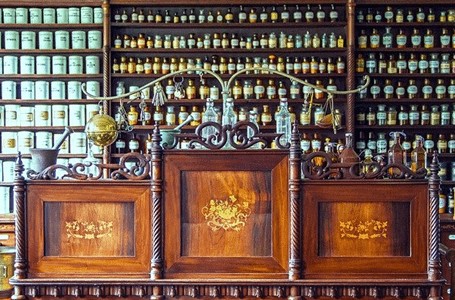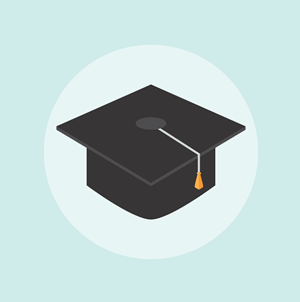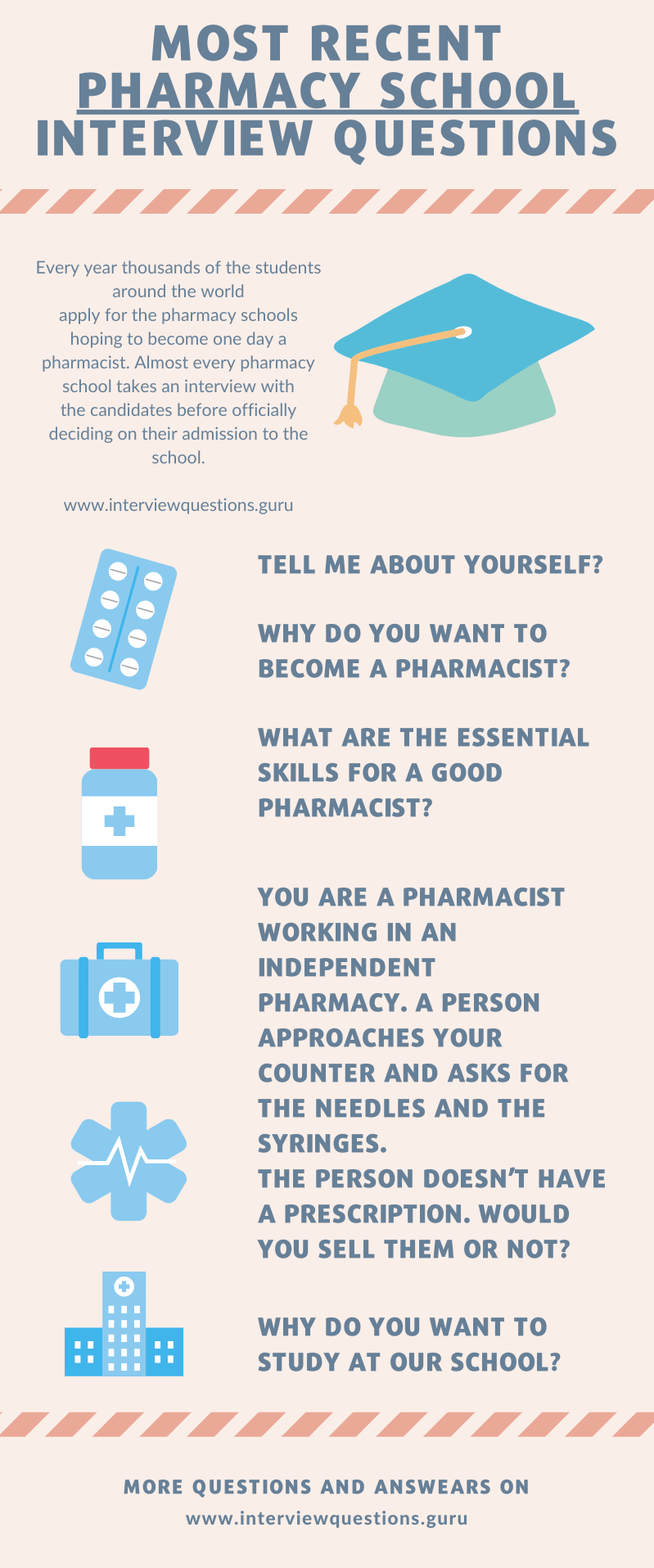
We continue our series of articles for future students. Today, we are pleased to share with you the updated list of the 10 most popular pharmacy school interview questions.
Every year thousands of students around the world apply for pharmacy schools hoping to become one day a pharmacist. Almost every pharmacy school takes an interview with the candidates before officially deciding on their admission to the school.
Pharmacy school interview questions are critical for both the candidates and the schools. Every question allows a candidate to learn more about the school. For the school, it is a possibility to check not only your knowledge and motivation but also your personal character. Let’s get started!
How to prepare for an interview – tips & checklist

Table of Contents
Pharmacy School Interview Questions
Tell me about yourself?
We can assume that 99% of all the interviews start with this question. It is a well-known ice-breaker question but still, it causes a lot of consternation among the candidates. Don’t be surprised in an interview and prepare in advance a short presentation about yourself. Remember to show yourself in the best light. Tell about your education path, about what led you to the place you are in today, and about your aspirations for the future.
You can also tell a little bit about yourself: your passions, interests, hobbies, etc.
To know more about how to tackle this kind of question, check our article “Tell me about yourself” question in an interview.
Why do you want to become a pharmacist?
This is also one of the first pharmacy school interview questions to expect. It will build up the base for the rest of an interview. Share with the interviewer how you developed an interest in the pharmaceutical industry and what you would like to do after graduation.
Be aware that pharmacists don’t need to work necessarily in the pharmacy. They are needed also in hospitals, in nursing homes, on military missions, etc. Some pharmacists do the research for the pharmaceutical companies, the laboratories, and the organizations defending the customers’ and the patients’ rights. And when it comes to the pharmacies, also, not necessarily it means a retail (privately owned or chain) pharmacy. You can work for an online pharmacy, compounding pharmacy, etc. There are many options to choose from.
It can also be the case that you already have some experience in the pharmaceutical or medical field, for example as a pharmacy technician or a nurse. If yes, be sure to mention it in an interview. Everything that proves your motivation will give you some extra points.
Becoming a pharmacist is your dream or your parents’ dream?
It is also one of the most popular pharmacy school interview questions. In this question, the interviewer wants to see whether applying to the pharmacy school is your or someone else’s decision.
No need to say, that it should be your conscious and independent decision resulting from your interests and passions. Having parents’ and friends’ support is of course always helpful but it isn’t a must.
Is there any doctor or pharmacist in your family?
The purpose of this question is to check again if the decision to go to the pharmacy school comes from you or if someone else puts pressure on you and forces you to become a pharmacist.
If someone from your family is indeed in any way related to the pharmaceutical industry, you can say that this person is a role model for you, that he/she is for you an inspiration and a motivation to pursue this dream.
What are the essential skills for a good pharmacist?
The list of the pharmacist responsibilities is long and so is the list of the required skills.
Apart from what we usually see in the pharmacy – dispensing medications prescription medications, counseling, advising on the safe usage, side effects, contraindications, possible conflicts with other medications, etc. – pharmacists can also prepare the custom-made drugs, administer vaccinations, advise how to quit smoking, monitor patients’ blood pressure, sugar and cholesterol, and many others.
So the technical knowledge (medications offer, use, composition, law, and regulations, etc.) won’t be enough. A pharmacist must have excellent customer service and communication skills. Not less important is the precision, the accuracy, and a knack for the organization. The lack of focus and the mistakes can have serious consequences and be life-threatening for the patients.
You are a pharmacist working in an independent pharmacy. A person approaches your counter and asks for the needles and the syringes. The person doesn’t have a prescription. Would you sell them or not?
This is one of the most common behavioral pharmacy school interview questions. In general, we can say that the questions about selling medications without a prescription are very frequent. And they are also tricky.
In such situations, the first thing to do is to check whether in your country or state it is legal to sell over the counter what a customer asks for. Also, if you have some doubts about the customer’s well-being or safety, you can also ask why it is needed and probably give some advice or tip.
What would you do if a member of your family is diagnosed with a serious illness and decides to rely entirely on alternative medicine?
Alternative medicine is a topic that arouses a lot of controversies. Usually, in such a question, the interviewer wants to test your ability to understand the different points of view and to analyze and compare the advantages and the disadvantages of both approaches.
So here, the best will be to say that you would start with a discussion, by listening to his/her arguments and trying to understand his/her point of view. The patient’s perspective and priorities can be different from the doctor’s or pharmacist’s ones. Next what you can do, is to present the other options and the advantages and the disadvantages of each of them. If there is a space for that, you can share your opinion but don’t be pushy, judging, or criticizing. Instead, show your empathy, understanding, and readiness to listen and to help.

How do you plan to finance your education?
The pharmacy schools are usually not cheap and most of the students must plan their financing very carefully and well in advance. Show the interviewer that you are aware of the costs and that you have a plan for the next months or even years. You can also think of a backup plan.
Be aware, that there are many financial options available for the students – choose the one(s) which fit(s) you best: payment in advance, payment in arrears, government student loan, study scholarships, paid internships, student income support, part-time job, … .
Why do you want to study at our school?
When you apply for a job, the employers always ask why you want to join their company. A similar situation is when you apply for a school.
This question is for an interviewer to understand why you chose this school and what differences you see compared to the other schools. Tell me what about your main decision criteria. You can praise the school for example about their place in the school rankings, school curriculum, campus location, extra-curricular activities, international exchange programs (e.g. Erasmus+ program ), scholarships, bursaries, etc.
List of 5 world’s best pharmacy schools according to topuniversities.com:
- University of Oxford (United Kingdom)
- Monash University (Australia)
- Harvard University (United States)
- University of Toronto (Canada)
- UCL (United Kingdom)
What would you do if your candidacy is rejected?
A good strategy to answer this question is to say that if you get rejected this year, you will apply again the next year. Say that you will use this year to analyze what went wrong and to work on yourself to be better prepared the next year.
With this question, we came to the end of our list of 10 Pharmacy School Interview Questions.

Questions that you can ask the interviewer
Don’t be surprised if during an interview you will be asked if you have any questions. It is a great opportunity for you to discover more about the school, the program, and the campus. Below, we put some examples of what you can ask about but, of course, think about what is important for you and what can help you to prepare for the future school-life.
- What leadership opportunities are available for the students?
- What research opportunities are available for the students?
- What mentoring programs are available for the students?
- What scholarships are available for the students?
- Is it possible to get financial aid or a bursary?
- What career planning services are available for the students?
- What sports clubs and societies are available for the students?
- What kind of events are organized on a campus?
- How would you describe an atmosphere on campus?
- What advice would you give to an incoming freshman?
Thank you for visiting interviewquestions.guru. Leave a comment and share with us your experience. If you liked this article, don’t forget to leave a thumb up!
Good luck!
